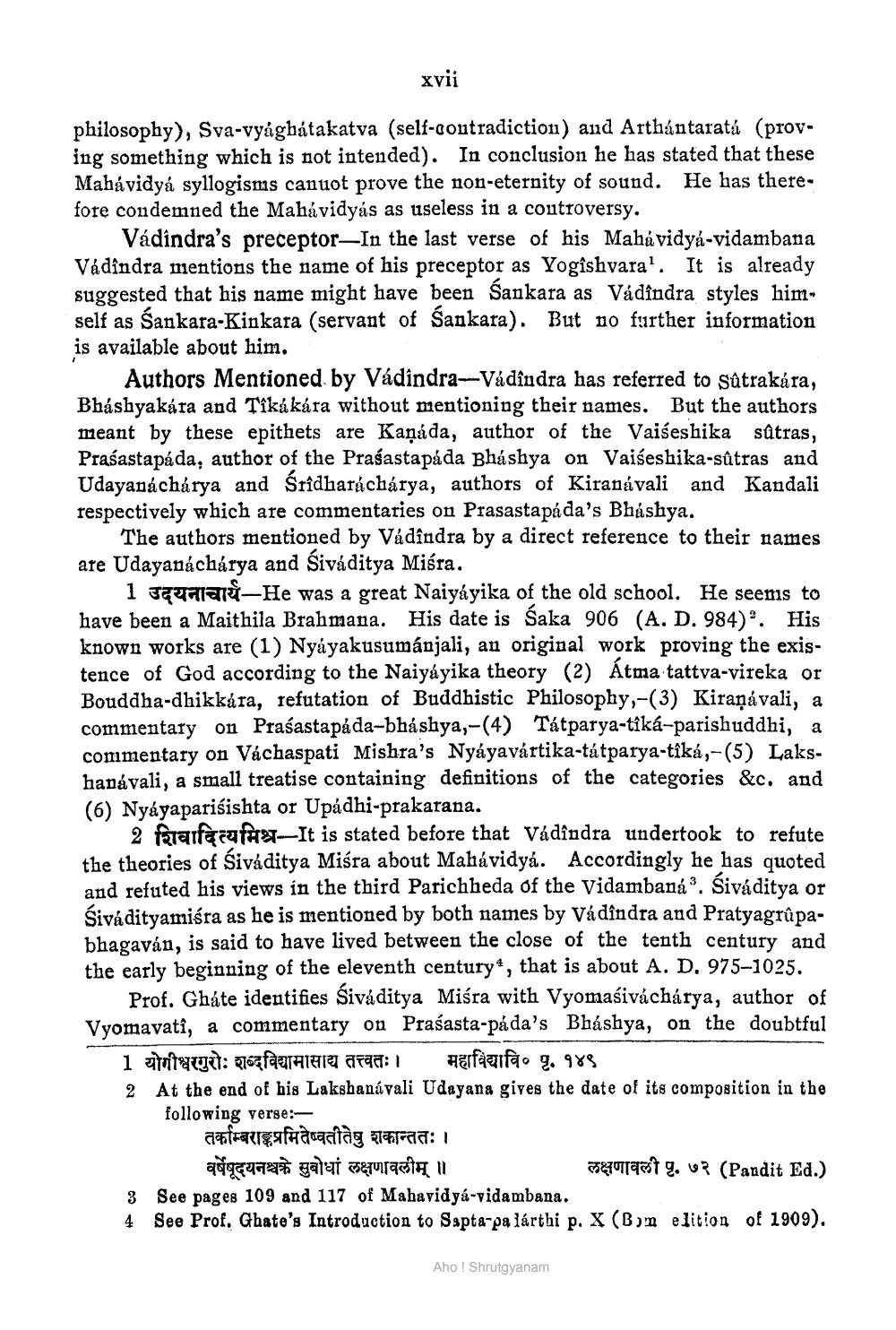________________
xvii
philosophy), Sva-vyághátakatva (self-contradiction) and Arthantaratá (proying something which is not intended). In conclusion he has stated that these Mahavidya syllogisms canuot prove the non-eternity of sound. He has therefore condemned the Mahavidyas as useless in a controversy.
Vádîndra's preceptor-In the last verse of his Mahá vidya-vidambana Vádîndra mentions the name of his preceptor as Yogîshyara'. It is already suggested that his name might have been Sankara as Vádîndra styles himself as Sankara-Kinkara (servant of Sankara). But no further information is available about him.
Authors Mentioned by Vádindra-Vádîndra has referred to sutrakára, Bhashyakára and Tikákára without mentioning their names. But the authors meant by these epithets are Kaņáda, author of the Vaiseshika sůtras, Prasastapáda, author of the Praśasta páda Bháshya on Vaiseshika-sûtras and Udayanáchárya and Sridharáchárya, authors of Kiranávali and Kandali respectively which are commentaries on Prasastapáda's Bhashya.
The authors mentioned by Vádîndra by a direct reference to their names are Udayanáchárya and Sivaditya Miśra.
1 -He was a great Naiyáyika of the old school. He seems to have been a Maithila Brahmana. His date is Šaka 906 (A. D. 984). His known works are (1) Nyáyakusumánjali, an original work proving the existence of God according to the Naiyáyika theory (2) Átma tattva-vireka or Bouddha-dhikkára, refutation of Buddhistic Philosophy,-(3) Kiraņávali, a commentary on Praśasta páda-bhashya,-(4) Tátparya-tiká-parishuddhi, a commentary on Váchaspati Mishra's Nyáyavártika-tátparya-tîká,-(5) Lakshanávali, a small treatise containing definitions of the categories &c, and (6) Nyáyapariśishta or Upádhi-prakarana.
HETIt is stated before that Vádîndra undertook to refute the theories of Sivaditya Miśra about Mahavidya. Accordingly he has quoted and refuted his views in the third Parichheda of the vidambaná. Siváditya or Sivaditvamiśra as he is mentioned by both names by Vádîndra and Pratyagrûpabhagavan, is said to have lived between the close of the tenth century and the early beginning of the eleventh century, that is about A. D. 975–1025.
Prof. Gháte identifies Śivaditya Miśra with Vyomasiváchárya, author of Vyomavati, a commentary on Praśasta-páda's Bhashya, on the doubtful
1 योगीश्वरगुरोः शब्दविद्यामासाद्य तत्त्वतः। महाविद्यावि० पृ. १४९ 2 At the end of his Lakshanávali Udayana gives the date of its composition in the following verse:
तर्काम्बराङ्कप्रमितेष्वतीतेषु शकान्ततः। वर्षेषूदयनश्चक्रे सुबोधां लक्षणावलीम् ॥
720 g. ? (Pandit Ed.) 3 See pages 109 and 117 of Mahavidya-vidambana. 4 See Prof. Ghate's Introduction to Sapta-palárthi p. X (Bom e lition of 1909).
2
Aho ! Shrutgyanam




